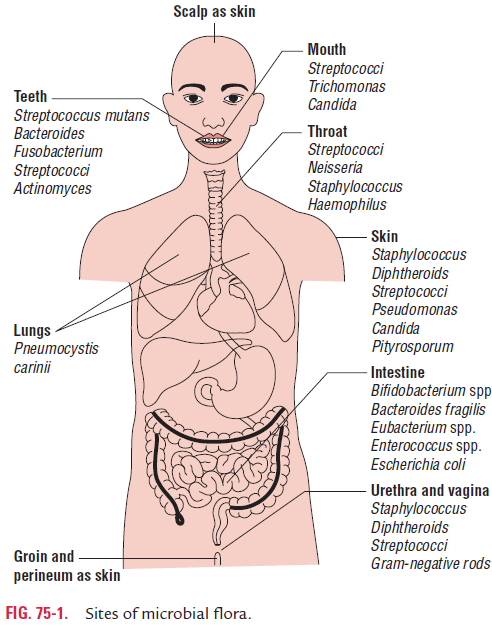Chapter: Microbiology and Immunology: Applied Microbiology: Normal Microbial Flora
Normal Flora at Body Surface
Body Surface
Human skin is constantly bombarded by organisms present in the environment. The skin is exposed to extremes of tem-perature, moisture, and to chemical disinfectants. There the microbial population is less numerous and complex than at other body sites. The skin is not a homogenous surface. There are relatively dry areas like palms and soles; areas with more apocrine glands, such as axillary, inguinal, and perianal areas; and areas rich with sebaceous glands like forehead and nasola-bial folds. Most organisms proliferate in the moist area. Thus higher densities of microbes are present in areas rich with sweat glands. The skin of face, perirectal area, or groin has a more complex microbial flora than that at other sites (Fig. 75-1).

Anaerobic bacteria are 10- to 100-fold more numerous on the skin surface as compared to aerobic bacteria. Gram-positive bacteria predominate over Gram-negative bacteria. The bacteria more commonly recovered from skin surfaces are Staphylococcus spp., Micrococcus spp., Corynebacterium spp., Peptostreptococcus, and Propionibacterium spp. Staphylococcus epidermidis is the most commonly isolated bacterium.
Othercoagulase-negative staphylococci found on the skin include Staphylococcus hominis, Staphylococcus haemolyticus, Staphylococcus warneri, and Staphylococcus capitis. Micrococcus luteus is the mostcommon Micrococcus spp. present on the skin and repre-sents 20% of the bacterial population on the head, legs, and arms. Aerococcus viridans, Streptococcus pyogenes, and anaero-bic Peptostreptococcus spp. also establish residence on the skin surface. Corynebacterium species present on the skin surface include Corynebacterium xerosis, Corynebacterium jeikeium, and Corynebacterium minutissimum. The anaerobic Gram-positivebacilli present on the skin surface are Propionibacterium spp. And Clostridium perfringens.
Gram-negative bacteria are generally not recovered from the surface of skin, except during transient colonization.
Acinetobacter spp. organisms have adapted to survive in moistareas of the skin.
Fungal colonization of the skin surface is transient. This includes colonization with yeasts (C. albicans, Malassezia furfur, and Rhodotorula) and dermatophytes. Among these, M. furfur is present in most of the individuals.
Related Topics